| Srl | Item |
| 1 |
ID:
119413


|
|
|
|
|
| Publication |
2013.
|
| Summary/Abstract |
In 1878, Britain developed the first systematic intelligence collection and analysis of China by a Western nation. Undertaken in response to intelligence failure and military defeat, the British Army in India established an intelligence section in Beijing using small numbers of Chinese-speaking British military officers. Their reports reveal their struggles to understand a culture and government radically different than their own and express a strong respect for Chinese military capabilities. The intelligence reports produced are a unique window into British history, intelligence practices and Chinese strategic thinking.
|
|
|
|
|
|
|
|
|
|
|
|
|
|
|
|
| 2 |
ID:
119414
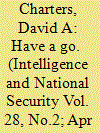

|
|
|
|
|
| Publication |
2013.
|
| Summary/Abstract |
Early in the Northern Ireland conflict the army took the lead in intelligence operations, including Humint. This article examines the case of 'Observer B', an agent run jointly with MI5. Using testimony and documents provided to the Bloody Sunday Inquiry as well as original archival sources, it offers a unique Humint case study that discusses the agent's recruitment, motivation, reliability, handling, product, and utility. This represents the most complete account that we have of this case, but gaps remain. It illustrates some of the limitations of clandestine Humint collection in situations where information may be time-sensitive. The article challenges the conventional wisdom about army/MI5 relations and shows how the two improvised and cooperated in agent-running.
|
|
|
|
|
|
|
|
|
|
|
|
|
|
|
|
| 3 |
ID:
119412
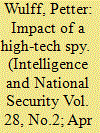

|
|
|
|
|
| Publication |
2013.
|
| Summary/Abstract |
Air Force colonel Stig Wennerström was the most dangerous spy to Sweden in the Cold War era. His espionage was found to have been especially crippling to the Swedish air defence and its high-tech systems. That is where repair work was seen to be most urgent. As the politicians turned down appeals for extra funding, it was up to the military system itself to handle the situation. In spite of this, the Supreme Commander appears not to have pressed for Air Force priority to repair resources. The service's proportion of the defence budget did not increase, and other quantitative and qualitative evidence points to a similar lack of Air Force priority. Three theoretical approaches are used to explain how this failure to act could have come about. A rationality model is discussed and compared to an organizational competition approach and to an approach based on the character of key individuals.
|
|
|
|
|
|
|
|
|
|
|
|
|
|
|
|
| 4 |
ID:
119411
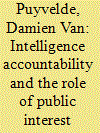

|
|
|
|
|
| Publication |
2013.
|
| Summary/Abstract |
This article explores the role of US public interest groups in the promotion of government transparency, as part of a broader agenda on civil liberties. Drawing on a set of declassified documents, and extensive oral testimony from protagonists, it is argued that such groups occupy a significant position as facilitators of intelligence accountability in the United States. Public interest groups represent a tradition of pluralism that lies at the heart of the American conception of democracy. A survey of the tactics deployed by interest groups to support liberal democratic principles demonstrates that these groups always rely on government institutions to carry out their oversight function. By virtue of this, public interest groups support intelligence accountability rather than hold to account the US government and its intelligence agencies.
|
|
|
|
|
|
|
|
|
|
|
|
|
|
|
|
| 5 |
ID:
119415
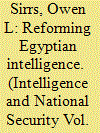

|
|
|
|
|
| Publication |
2013.
|
| Summary/Abstract |
In 2011 intelligence reform became a timely and pertinent topic in Egypt with the overthrow of President Hosni Mubarak by mass demonstrations. Yet two outstanding questions persist: can Egyptian intelligence be reformed? What would intelligence reform entail in the Egyptian context? An examination of historical Egyptian intelligence reforms suggests that 'reform' in the Egyptian context usually means greater efficiency and centralization at the expense of public oversight and accountability. Prospects for fundamental intelligence reform are further hampered by Egypt's authoritarian traditions, its relatively weak legislature and judiciary, lack of an empowered civil society, censorship and an apparent official addiction to secrecy.
|
|
|
|
|
|
|
|
|
|
|
|
|
|
|
|
| 6 |
ID:
119416
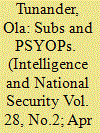

|
|
|
|
|
| Publication |
2013.
|
| Summary/Abstract |
In the 1980s, the Soviet Union was believed to have targeted Sweden by sending submarines into Swedish archipelagos and naval bases, which forced Prime Minister Olof Palme to terminate his ambitious foreign policy. The 'imminent Soviet threat' changed Swedish public opinion drastically. Twenty years later, statements made by the responsible US and UK leaders, including then US Secretary of Defense Caspar Weinberger and then UK Navy Minister Keith Speed, show that these operations were run by US and British submarines testing Swedish coastal defences. Then US Secretary of Navy John Lehman and the Swedish Secretary of the Submarine Inquiry, Mathias Mossberg, indicate that these operations were also deception operations and psychological operations. Swedish former defence ministers have said that 'it was wrong to point to the Soviet Union', indicating that the more visible submarines may have been from the West. Ralf Lillbacka's article in Intelligence and National Security in 2010 does not take this information into consideration. The technical evidence we now have is proof of Western submarines operating in Swedish archipelagos. This evidence confirms the statements made by responsible leaders.
|
|
|
|
|
|
|
|
|
|
|
|
|
|
|
|